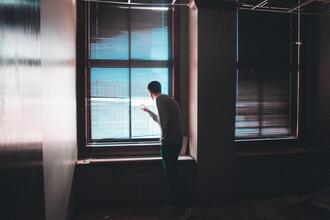 By Nanci Nilles Psy.D. Lately, I have heard the term “re-entry anxiety.” It is the apprehension some people have as the country moves to a post-pandemic phase. Mental health professionals have found a few themes present in these fears; a fear that a year of lockdown has decreased one’s social skills and a “lurking” fear one may contract or carry COVID19 variants to others. Symptoms of re-entry anxiety may include worrying about social situations, distractibility, and a desire to avoid others. If you have never struggled with significant anxiety, such experiences are disconcerting and seemingly at odds with the lifting restrictions. If one has an anxiety disorder, re-entry anxiety may exacerbate existing worries. These more intense symptoms can feel like a significant setback. With its limited interactions with others and the absence of opportunity to travel, the past year resulted in repetitious days and solitary routines. Breaking these patterns, even when doing so is perceived in a positive light, may feel unsettling and cause anxiety. (Daily Briefing 2021.) So what can we do to help ourselves cope with the re-entry anxiety? The first is to acknowledge the feeling of dread. Fear is difficult to ignore, and pushing away or trying to control it often makes it feel more intense. It is a paradox; by acknowledging anxiety's presence, we can exist with it more peacefully. We can also recall other changes we have navigated successfully. These memories build our self-confidence and remind us how often facing a challenging time leads to transformation. (Cuncic 2021.) A practical approach is to set small, consistent goals for re-entry that allow for gradual exposure to anxiety-producing situations. Treating ourselves with self-compassion as we face what makes us uncomfortable is essential. There is no need to compare ourselves to what others are doing. By honoring our own pace, we practice gentleness towards ourselves, which also helps to lessen anxiety. (Dupont 2021.) And lastly, if coping with re-entry anxiety feels like too much, it is ok to ask for assistance. Help can be increasing your support system, upping self-care, joining a support group, or seeking out treatment. Just know, it is ok to be anxious, and you need not navigate this passage alone. Arlin Cuncic, A. (2021, April 27) Adapting to Post-Pandemic Reality When You Have Social Anxiety. http://www.verywellmind.com/adapting-to-a-post-pandemic-reality-when-you have-social-anxiety Daily Briefing (2021, March 30). Anxious about returning to 'normal' post-Covid? You're not alone. DailyBrief. http://www.dailybrief.com/anxious-about-returning-to-a-normal post-covid-you-are-not-alone Dupont, E. (2021, March 21) Hitting the Pandemic Wall. Anxiety Training.http://www.anxietytraining.com/hitting-the-pandemic-wall
0 Comments
Leave a Reply. |
Archives
July 2024
|

